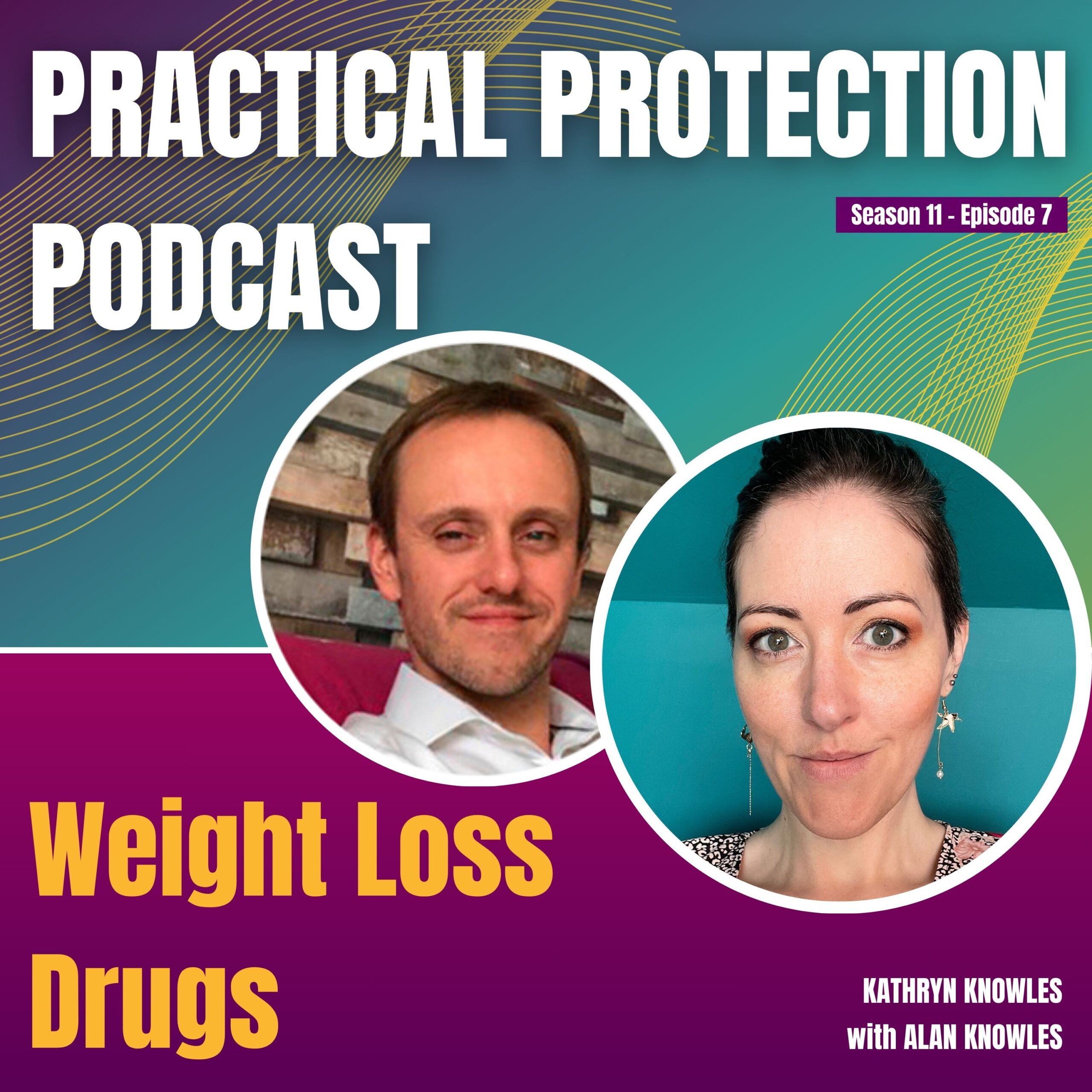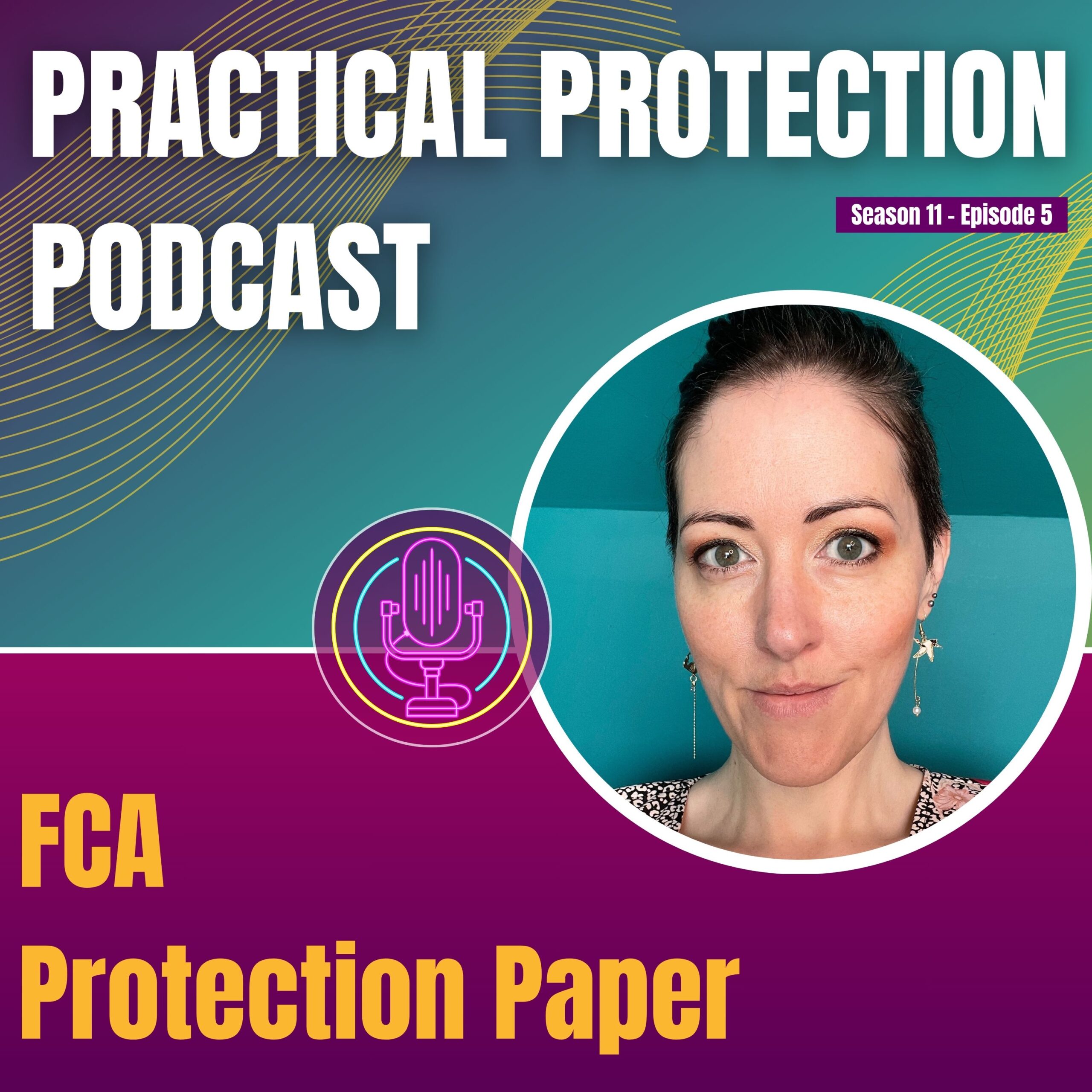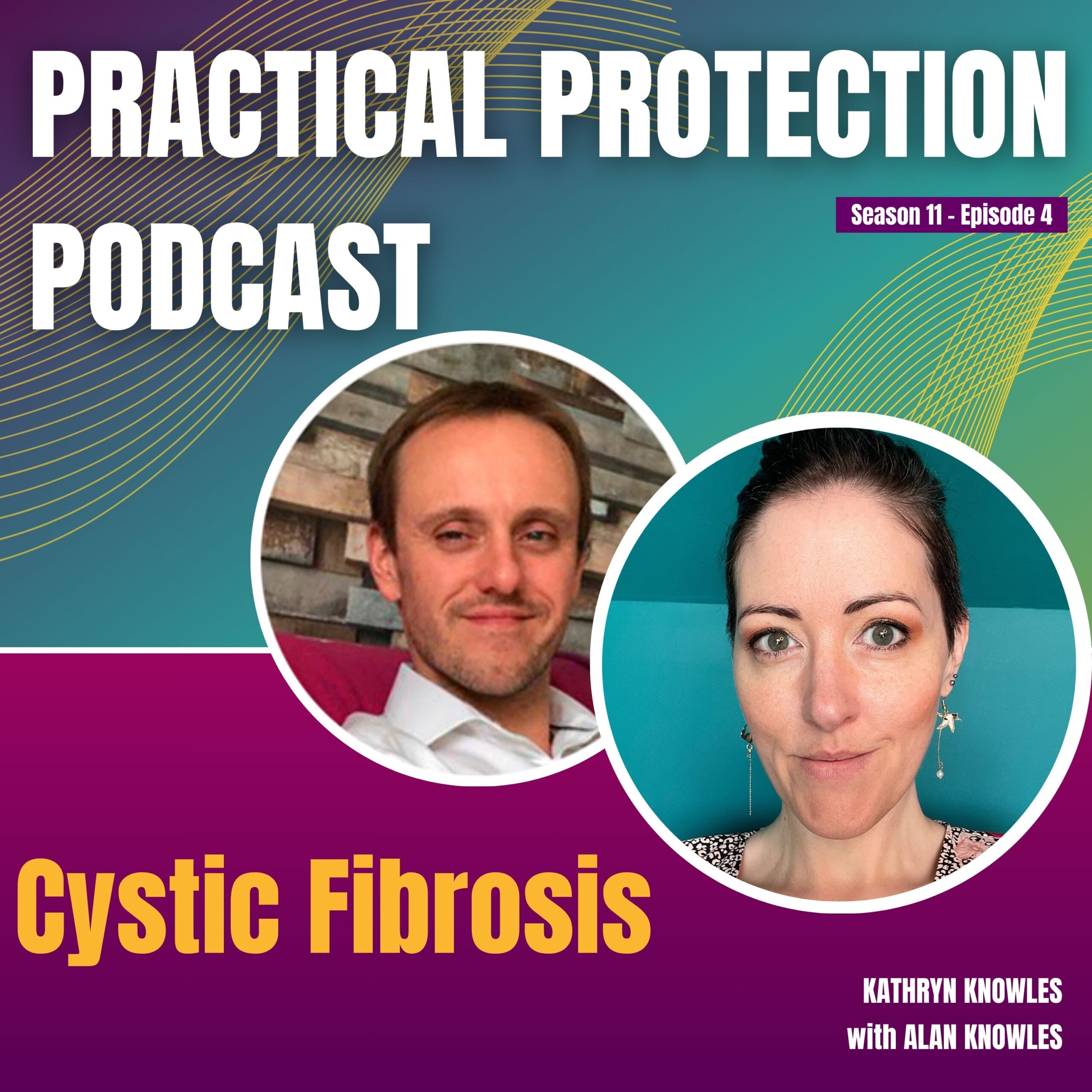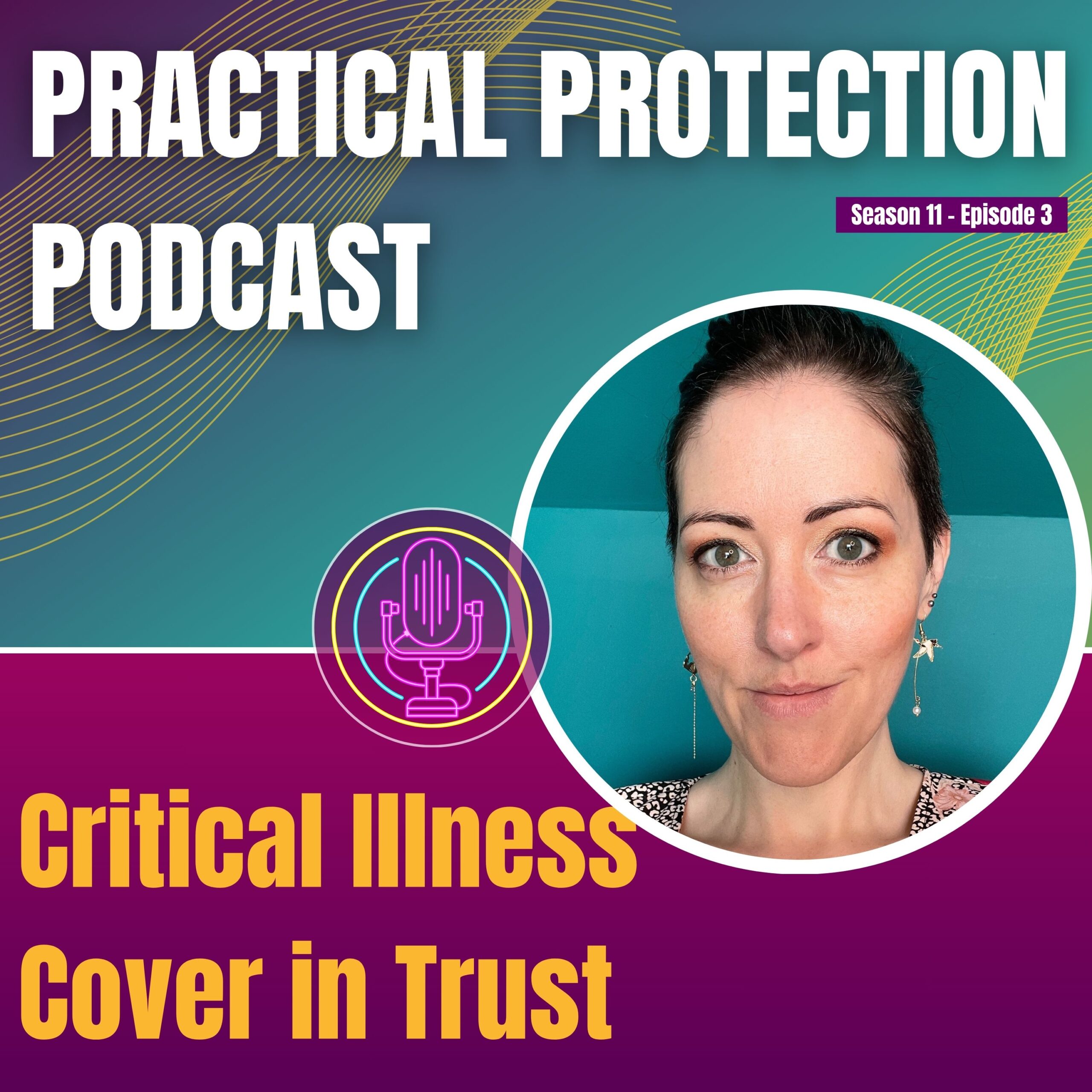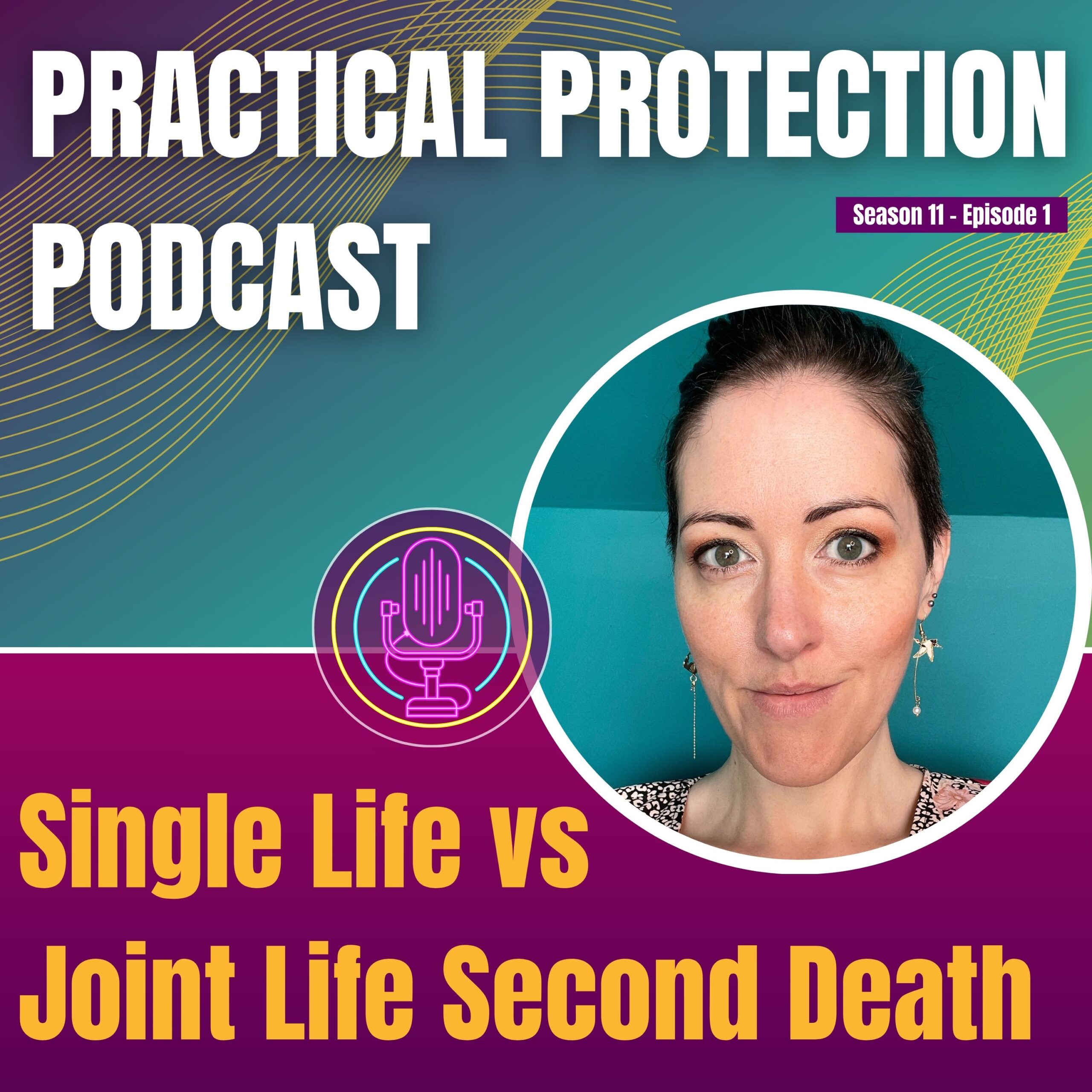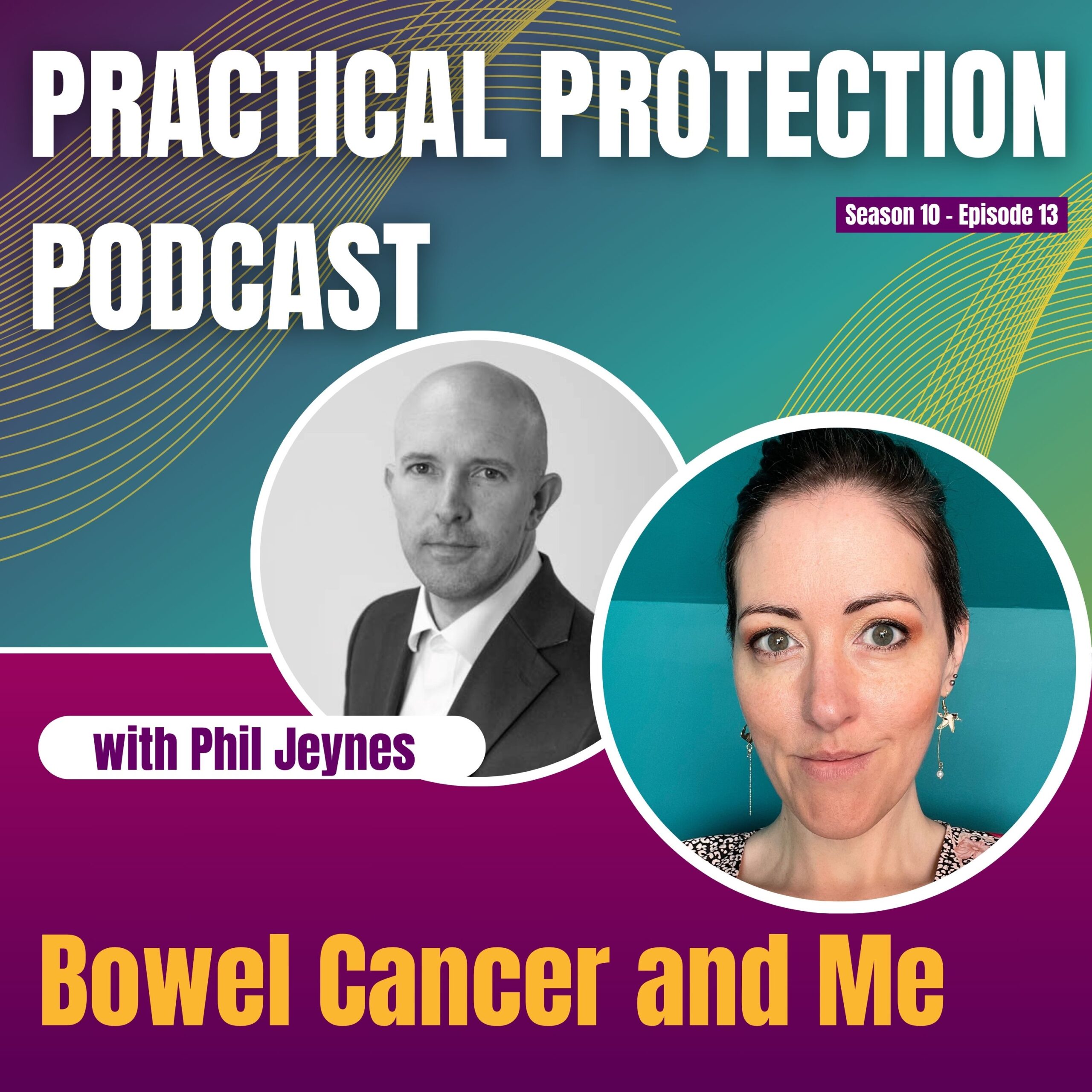Hi everyone, I am back with the final episode of season 9 and we have some changes coming up with the podcast. We are saying a very big thank you and farewell to Matt Rann who has brought our underwriting insights for the last 6 seasons. Don’t worry, we will still be continuing with underwriting insights to help you better understand your client’s circumstances and the protection insurance options that they might have.
The last episode of season 9 is all about group critical illness cover. We have recently covered group life insurance and group income protection, and whilst they are all quite similar, group critical illness cover has a couple of big differences.
The key takeaways:
- Group critical illness cover is paid for by a company but the premiums are treated as a benefit-in-kind for the people covered
- People who cannot personally get critical illness cover can be covered by group critical illness cover, but there will be exclusions for pre-existing conditions
- A case study of group critical illness cover
I will be back in 2025 with season 10 as we enter our 5th year of providing the protection insurance training for you.
Remember, if you are listening to this as part of your work, you can claim a CPD certificate on our website, thanks to our sponsors NextGen Planners.
00:08
Hi everyone. We are on season nine, Episode 15, the last episode of this season. And today is just me, and I’m going to be taking you through some of the key points of group critical Knowles cover. This is the practical protection podcast.
00:28
So I have a bit of news. There’s a bit of a change in terms of the podcast as we’re going forward. So as many of you will know for having listened for so long, we’ve been doing the podcast since it was right at the beginning of the pandemic, actually. So it’s almost five years that I’ve been putting out episodes and getting out information to everybody. And Matt ran, who is a consultant underwriter, comes on the episode and has done regularly since February 2021
00:57
since season three, and he has been involved in giving us some incredible insights into medical conditions and underwriting outcomes, what he would typically see, things like that. And Matt is now at a stage where he is no longer joining us in the podcast, so I’d like to say a massive thank you to Matt for all of his input over these years over the seasons, it’s been really, really valuable and to have his input. And just like Andrew Whibley, Roy McLaughlin, who had been co host before, you know, we’re all doing this voluntarily. It’s, you know, it’s all free. We’re all doing it without any kind of sorry payment at all for being involved. So it’s, it’s a it’s a really lovely thing that everybody has given their time to try and improve. Obviously, the the understanding for advisors and for charities. Also because insurers, me insurers, I do know listen as well, so they can, sort of like, hear it from what we see down at when we’re actually doing the advice and everything. And so just a big thank you to Matt and yeah, let’s get on to recording this last episode. Another little extra is that I did take a little bit of a break over the summer, and I’m going to take another little bit of a break. So again, if anybody has been listening, many of you will know that my parents aren’t very well we’ve had in the last month or so, my dad has been diagnosed with advanced Parkinson’s and dementia. He’s been in hospital for quite a bit. He’s been in a care home for us, but he’s just about ready to come out of the care home, so I feel like I need to for a little bit of time. I need to obviously be really on hand for my mum and dad and and also, just to sort of give myself that little bit of a breathing spaces as well, in terms of my own mental health and trying to juggle so many things. So
02:52
this will be going out this episode in November, and I’ll be back in 2025
03:00
carrying on with doing underwriting insights, industry observations, things like that in 2025 so fingers crossed, you’ll all still want to come and listen and and, yeah, hopefully it’ll just give me that little bit of a Refresh and Reset that I think I need At the moment.
03:20
So group critical illness cover, and very similar, in a sense, what we’ve done before in terms of looking at the group life insurance, group income protection. So there are some differences, some quite specific differences, but we’ll just go through some of the key things, just in case you’ve not listened to the other episodes that we’ve done about group. So we have the fact that it needs to be an employer and employee relationship. So that is usually signified by the person being on the PAye. It might be that you’re speaking to a smallish company. You might be speaking to the Managing Director, if it’s a limited company, they will also be on the PAYE, usually.
03:58
But that is really, really important, so do check that I do remember speaking and supporting with somebody not long ago who had wanted to look at group insurance, but they weren’t on the PAYE, so it kind of, you know, didn’t necessarily work exactly how they were wanting it to work, obviously, but we just need to show that that is the relationship that is. There it is. We do build the critical analysis cover built upon the company structure. Like I’ve said before, it might be that you ensure all the staff and that we do it in terms of different categories. So it might be that everyone gets exactly the same as the directors, managers. All of employees all get the exact same benefit. But usually you would have say, like, the directors want to maybe have higher benefit than managers, and then the managers would have a higher benefit than the other employees. But it really comes down to what the company’s wanting to do in terms of their employment support package and their their perks.
04:56
And just to sort of like, debunk and.
05:00
Myth that it does stuff like seem to go around every now and then. You do not have to ensure everybody within a company when you’re doing group cover. And you can do you can just ensure the directors, if you want, and not ensure anybody else. That’s absolutely fine. You can. You could actually, and I have had it before where directors have said, actually, where we don’t need this, but we’d like to put it in for an employee perk for everybody else. So we actually did the covers all employees, ignoring the directors. And that was like the category, and not the exact technical wording that we use, but you know, that was kind of like how it was set up. And so you can do that. The main thing is, and it’s the really key thing, is that with a group, we have to avoid anti selection. So when I’m saying you don’t have to ensure everybody, you don’t, but you have to ensure everybody that is eligible based upon the category that you’ve set up. Such as a very, very quick reminder, you’ve got five directors. You’re setting up a category for five directors. One of them is due to leave in about three months time.
05:59
Well, it doesn’t matter that they’re due to leave, they get covered now, or one of them is upset all the rest of them, and nobody wants them to have the insurance. Well, that’s tough luck. If they’re a director and they’re eligible by the category that is being set up, then they would need to be that way. Same for employees and things like that. You know, you can’t just not insure people because they’ve annoyed you, or because you don’t like them, or whatever, and things like that. You everybody who is eligible has to be covered.
06:27
And another quick reminder, postcodes can really influence the options, so insurers will have, like, a catastrophe limit in terms of the group, where they’ll say, right, we will ensure you know in the event that something really disastrous happens, and something happens at that location, geographical location, and everybody passes away. The maximum that we’ll pay out is this, and this is most relevant when you are looking at people based within the cities, because, you know, we’re talking about, you know, potentially large acts of violence or terrorism, unfortunately, and what we’ve classed as acts of God. So natural environmental disasters, which could take out a street, or something like that. And the insurers will say, sometimes, well, actually, you know, if you look at this street, or if you look at this building and all the businesses that are in it, we are actually near our maximum as to what we will be prepared to pay out in this event. So we’re not going to take on any more businesses in that location. So it might be that you need to use a different insurer. And there’s lots of insurers working in the group space. There are slightly different things. Some of them can, you know, you have to have minimum numbers of people that are being covered. So it’s just a matter of getting used to the different insurers, and sorry, building up. Was very a big fan of spreadsheets and building up like a little bit of a database to say, well, this insurer requires me to have at least 10 people, and they won’t insure people if they’ve work in this kind of an industry and things like that. And and just build up that information
07:55
employees abroad can massively influence the insurance options as well.
08:01
I don’t know all the technicalities as to as to why that is the case and but it often comes down to the percentage of how much of the employees are outside the UK versus inside the UK. And this isn’t to do with travel abroad for business. This is to do with people who are outside, properly outside of the UK. And it might be that you need to look at international group options, do double check if you’re looking into international group options, because when you do group, it will be a different agency to your usual personal and business agency that you would have as an advisor. And then if you were to do international group, that’s, again, often a completely new agency as well, to be able to do it in the international space. So just keep an eye on that when you are looking at anything. But anyway, so in terms of the percentages, so let’s say if you had 10 employees and one of them is living abroad, you can find that insurers will say, well, actually, the percentage of people outside of the UK is above our limit, so we’re not prepared to take it on. So if you had 10 people and one person abroad, that’s 10% of the workforce is outside the UK. So again, just be very mindful when you’re chatting to people as to you know, are they all based here? Do find out, obviously, if they’re traveling to anywhere particularly high risk, insurers do tend to ask about travel outside of the UK Tom or high risk locations. It isn’t always a no, but it is just worth checking. Obviously, applications, again, can be very different between different insurers. Some will ask medical questions like, have you had cancer, house, attack or stroke in the last 12 months? If the answer is yes, then you wouldn’t be able to have a cover with them. Some others ask a much longer set of questions. Some don’t ask any questions at all, but different insurers acts in different ways. In the sense of some of them will say, Well, if you’re aware of something health wise, you need to tell us about it. And others say, actually, you know when we don’t want that information.
10:00
Information up to a certain amount of cover. So again, have a really good chat with your account managers at the different insurers, things like that, to to make sure that you’ve got the right information for when you’re speaking to, to the obviously, to the to the systems, and knowing that you’re actually able to go ahead with that cover with that insurer. So a bit more specific to the group critical illness cover. The free medical limit is often up to about 300,000 so and free medical underwriting levels with the group side of things, it basically means that up to say, like that, 300,000 pound per person, they are not going to rate decline or anything, and the person will be covered. You know, you know, in a sense, completely, I’m going to put a caveat next to that. Completely. I’m going to put, like, little bunny ears quotation marks around it with the group, critical illness side of things. So bear with me while I get to that. And, you know, they can have it. They’re eligible for the cover. There’s no, let’s say there’s no sort of like, you can’t have this cover, and that free medical underwriting limit can change depending upon the size of the workforce. The more people, the higher the limit tends to be. That’s the same with all the group options, usually. And so a carry out here those bunny ears that I did is to do with what’s known as a Pecci, which is a pre existing condition exclusion, which applies to group critical illness cover. It does not apply to group life or group income protection the majority of the time, but it does apply to the critical illness cover at all points. And basically means that if you’ve had obviously a condition that is
11:35
listed in the policy or is, you know, potentially much more likely to happen due to another condition or treatments, or anything that you’re experiencing, then that can be excluded on the critical illness cover,
11:51
which is why, you know, I tend to, as an advisor, I tend to go more towards the group income protection, because we don’t have the pre existing condition exclusion on there, usually saying, usually, because I’m Going to caveat that again in a little bit and but so there’s that aspect of it, and there’s another reason as well. So again, like group income protection, we have the fact that we it’s the premiums are paid for by the company, the offset against cooperation tax with the group. Criticalness cover. The premiums are paid by the company. However, they are classed as a benefit in kind. So they are taken from a person’s salary unless, well, basically, the only way to kind of like, get around that is if the company kind of UPS everybody’s salaries to account for the premiums that they will be paying. But it gets a little bit tricky, a little bit finicky, and what can be really hard as well, when you’re doing the quotations is that people can say to you, well, what would this person be paying? And what would that be paying? So I can see that the overall price is this, but what would it mean for each individual person? We need to know. And what’s really difficult is that you actually don’t know when you’re doing the quotations, and so it’s actually kind of really gone ahead and moved forward. You don’t know what each individual person is going to need to pay towards it. And obviously, if you say to people, would you rather, you know, if you say to the workforce, would you rather have this and you’re going to need to pay towards it out of, you know, as a benefit, in kind, always prefer to have group income protection and the company completely covers it, you know, it’s, I don’t know. I don’t know. I just kind of feel like a lot of people would prefer the group IP side of things as well, because of the fact that there isn’t this pre existing condition exclusion on the IP and but that all being said, people do want critical illness cover. It is, you know, the thing where, you know we’re saying people are going to be covered for cancer, heart attack, stroke, a number of other things. And that is where a lot of people’s worry is, we are starting as an industry to be able to to encourage people to really see the income protection benefit side of things, but the critical illness cover. It’s, you know, especially hearing something where you covered for cancer, and it so specifically states cancer, whereas obviously income protection doesn’t specifically state that, even though, obviously I’m going off on a tangent there, it does cover it anyway, um, assuming that you have to have time off work, I’m going to have to have just put so many caveats in it. So just bear with me as I’m whittling along. But you know, so many people do, do want it. And you know, in terms, when we’re talking about the pre existing condition exclusion, it’s actually really, really important because,
14:17
you know, we can’t say as advisors. Oh well, because you’ve, you’ve experiencing this, this means that this is ruled out. So a really good one, just going back, have Matt van popping into my mind there, going back to the type one diabetes side of things. So, you know, somebody with type one diabetes, and they are covered by group critical illness cover there are, there are quite a few things that you know can potentially be a higher risk due to having that. You know, cancer is one of them. And as an advisor, and you know, not knowing absolute ins and outs of the way that the underwriters would be looking at a claim, the claims people be looking at a claim, especially when they just put on the pre existing condition exclusion. I don’t know if a cancer claim will potentially be turned down.
15:00
If somebody did have type one diabetes and was covered by group critical illness cover, obviously any insurers or reinsurers that are listening, if you do have an insight into that, that’d be fascinating to just hear. But obviously, things can change. Philosophies can change with insurers as well, and as always, it would be down to very much the individual consideration of that one person specific claim, but group kick does definitely have its place. So as an example, you know, somebody’s had a heart attack, the way that the industry works at the moment. So we’re talking we’re getting towards the later part of 2024, at the moment when I’m recording this, if you’ve had a heart attack, you will not be getting critical illness cover on the standard market in the UK, there are some options that you can get, again, the pre existing condition exclusions. But you know, generally, in terms of, like the the strong quality contracts that we were getting,
15:55
you know where you cover for often, like 5060, things on the personal market, at least in terms of critical illness policies that’s not going to be available however, somebody who has had a tag, had that again, somebody who has had a heart attack, could be covered by a group of critical illness cover. Then they will be covered under that free medical underwriting limit without any
16:19
ratings or declines, or anything like that, but there would be the exclusion relating to the heart attack, and again, in terms of treatments, medications, things like that. It’s not possible to say exactly would, what would and wouldn’t be excluded in terms of that pre existing condition cover. So hopefully that’s been useful. That’s not really. The really key bits just to be aware of is that with group critical illness cover, the premiums are different. It is benefit in kind. We do have that pre existing condition exclusion. So whilst they’re saying free medical underwriting limit, yes, that is there, but there is still that exclusion set in there up to that amount. And obviously, if somebody, in terms of the category, is eligible for more than the free medical underwriting limit, you can apply for that. You would just need to be conscious that you would they would need to go through medical questions, and you know, they might be rated or declined the amount above the free medical underwriting limit. The free medical underwriting limit itself should stand. And the reason I say that should stand is that I have come across instances where people have had,
17:31
it’s not necessarily the group cover hasn’t necessarily been an employee benefit that’s been given by the company. It’s kind of a they have it, and people can pay to be a part of it. And in a different way to however been described in the group kick up cover, you know. And in a sense of it can be for the life insurance with the income protection, people can potentially buy into those things through their company, and they just kind of the company taxes like a bit of a portal to the insurer, in some ways. And there can be times with those situations where somebody is paying for it themselves, where actually and volunteering to sort of like take it on, the insurers have sort of like said, well, actually, you’re paying to be a part of this, but we’ve looked at your health and we’re not prepared to cover you, so just really be conscious. And I’m saying that from the point of view as an advisor, you know, one of the things I do when I’m checking with people, do you have death in service benefit? Do you have, you know, enhanced sick pay, things like that? One of the things I tend to check is, you know, is this something your employer provides, or do you pay for this? Just so that I can maybe try and give a bit of guidance, maybe just without causing any kind of like concerns or alarm bells, maybe just say to them, Do you happen to have a copy of like, any of the documents related to that, just so I can have a quick look in it and see if there’s anything that puts in any kind of sort of like technicalities, which means if there was A claim, they actually wouldn’t be covered. Okay? Right. So, bit of a case study then. So I always like to give the case to these, obviously, just to give an example. So we had a firm that we were going to be helping business consultancy, and they had it where the directors wanted to be covered for 250,000
19:18
each. In terms of their cover. They want their managers to be covered for 500,000 each in terms of the critical illness cover.
19:27
The policy was set to go to age 70. And we do tend to find that with quite a lot of these policies, they’ll say, maybe spa so state pension age or 65 whichever is later, or quite a few of them now, allowing you to, sorry, say, well, age 70, and for this company, when we did that, the premium ended up being 390 pounds per month. So that was to cover everybody in that company. And what would happen is, in terms of those premiums, is that, once the policy started, you then get the break.
20:00
Down the accountants, and then step in and go right. Well, this is what you’ll be doing, and this is what you’ll be paying, things like that for each individual person.
20:10
Once you do sort of get towards a certain size of company, insurers can tend to change where the premiums work little bit, which can make it a little bit simpler, which is, is always nice, but you do tend to find, you know that a lot of advisors, we are speaking to smaller businesses and and you’ll just have that working in the background. So thank you very much for listening. Everybody as say, we will be back in 2025
20:36
I’ve already got the things that we’re going to be covering lined up. Looking forward to having a little bit of downtime. I have to say, nice to just sort of like, maybe really get into the Christmas spirit and, and just sort of like, have a bit of a chill out and, and obviously, as I say, really focusing on helping my my family at the moment. So I hope you found it useful. If you have any suggestions for things that you’d like me to cover in the next season. Please do feel free to get in touch, and I will go through them and try and get them covered for you. As always, please visit the website, practicalhythmprotection.co.uk, to listen to any of our episodes and to also get your CPD certificate. Thanks to our sponsors, the octo members. Thank you for very much. Everybody. Bye.
Transcript Disclaimer:
Episodes of the Practical Protection Podcast include a transcript of the episode’s audio. The text is the output of AI based transcribing from an audio recording. Although the transcription is largely accurate, in some cases it is incomplete or inaccurate due to inaudible passages or transcription errors and should not be treated as an authoritative record.
We often discuss health and medical conditions in relation to protection insurance and underwriting, always consult with a healthcare professional if you are concerned about any medical conditions and symptoms we have covered in any episode.
